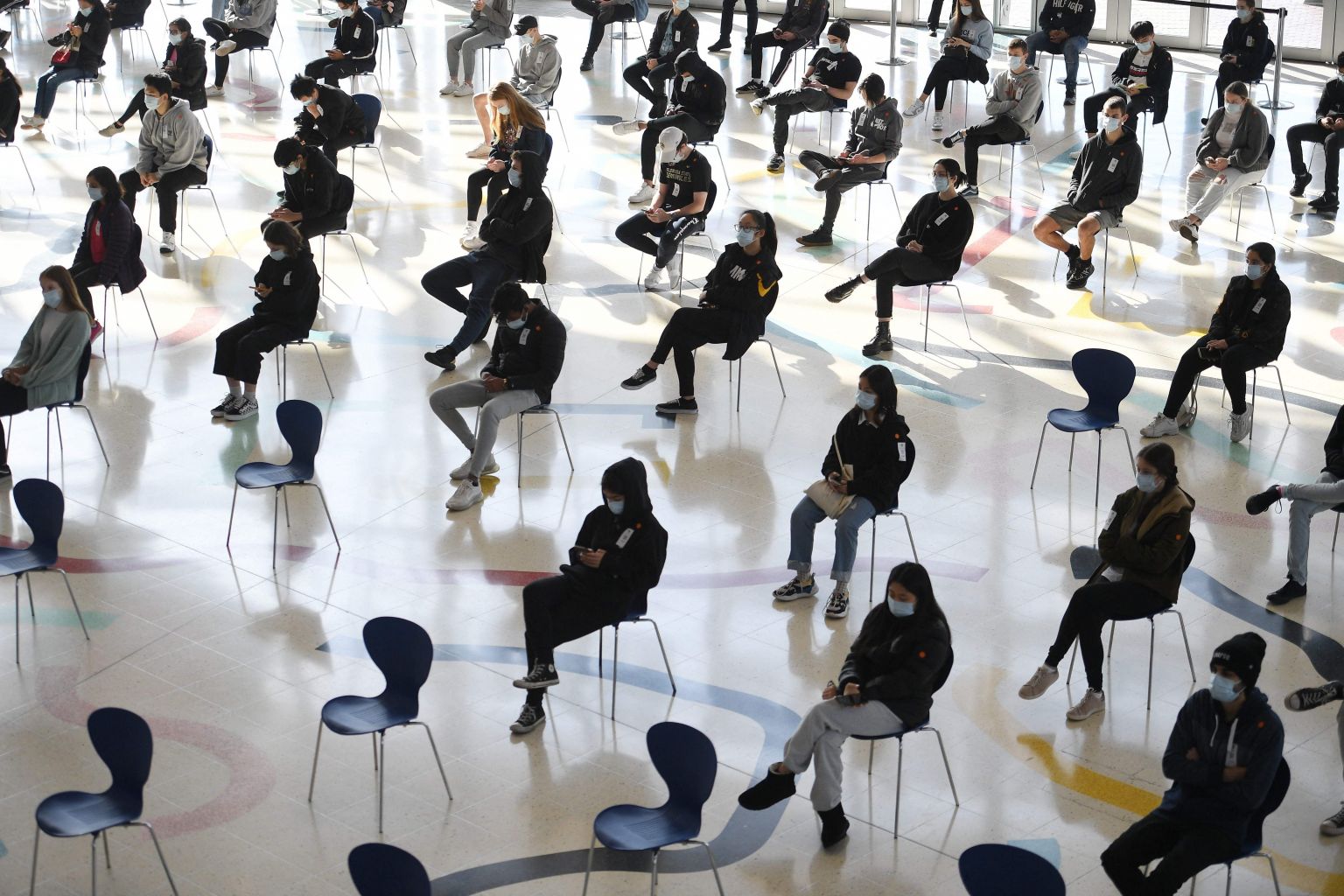Australia considers lottery prizes and cash handouts to accelerate Covid-19 vaccine roll-out
Sign up now: Get ST's newsletters delivered to your inbox

Students wait for their turn to receive their first dose of the Pfizer Covid-19 vaccine in Sydney, on Aug 9, 2021.
PHOTO: AFP
Follow topic:
SYDNEY - A worsening Covid-19 outbreak in Sydney has led to a new debate about how to persuade Australians to quickly get vaccinated.
While only a small number are unwilling to be vaccinated, the authorities are keen to accelerate the roll-out as fresh vaccine supplies land.
As at Wednesday (Aug 11), just 24 per cent of those aged 16 and over were fully vaccinated and 45 per cent have had one dose. In New South Wales, which recorded 344 new local infections on Wednesday, 24 per cent of the population are fully vaccinated and 48 per cent have had one dose.
These rates are well below the federal government's target of an 80 per cent vaccination rate - a level at which the nation will effectively return to normal, including reopening its borders and ending lockdowns. Currently, the country's two largest cities, Sydney and Melbourne, are in lockdown.
Various schemes have been proposed to boost vaccination rates, including a weekly lottery in which 10 vaccinated people would win A$1 million (S$997,00) each. In the weekly lottery scheme, each person would receive a lottery ticket for each time they have been vaccinated.
Separately, the opposition Labor party has proposed giving cash payments of A$300 each to all who are fully vaccinated.
The coordinator of the country's vaccine roll-out, Lieutenant-General John Frewen, said the government was considering all options.
"I mean there's cash, there's the idea of lotteries - all of these things have been discussed," he told reporters last week.
"What is resonating with people right now really is being able to get back to the sort of lifestyle we used to enjoy - international travel, not having to quarantine, not having to go into lockdowns."
But Prime Minister Scott Morrison rejected the cash handouts proposal, saying it was unnecessary and wasteful. He said it was an "insult" to suggest that Australians would not get vaccinated unless they were paid.
However, many economic and health experts disagreed, saying cash handouts could incentivise people and stimulate the economy.
An economics expert, Mr Peter Martin, a visiting fellow at the Australian National University, said research showed that small payments were "extraordinarily effective, often more effective than big ones". He also pointed to official modelling which showed that the cost of a nationwide lockdown was about A$3.2 billion per week.
"Paying people to get vaccinated fits the government's criteria of a response that's 'temporary, targeted and proportionate'," he wrote on The Conversation website.
"The costs are tiny compared to what's at stake."

A man receives a dose of the Pfizer Covid-19 vaccine in Australia's first drive through vaccination centre in the outer Melbourne suburb of Melton on August 10, 2021.
PHOTO: AFP
A survey in June by the Melbourne Institute at the University of Melbourne found that 54 per cent of people who were willing to wait to be vaccinated would do so as soon as possible if they received a cash handout. Another 42 per cent said it would not speed up their vaccination, and 4 per cent were unsure.
The institute has been tracking vaccine hesitancy in Australia, with its latest survey on July 23 showing 12 per cent unwilling to be vaccinated, down from a peak of 19 per cent in May. A further 10 per cent remained unsure if they would be vaccinated, though this number has been dropping.
Most experts believe it would be difficult to persuade those unwilling to be vaccinated, but it may be possible to change the behaviour of those who are unsure.
The lottery proposal was made by the Grattan Institute, a think-tank, which said it would help to target those people - the "moveable middle" - who may consider getting vaccinated but have been delaying.
"What you want to do is convert them from 'it's not a rush' to 'I'm going to get vaccinated tomorrow'," Dr Stephen Duckett, from the institute, told The Sydney Morning Herald.
While Australia's low vaccine rates are largely due to failures to secure and distribute supplies, the nation may need to incentivise people as supply shortages are addressed, most likely by October.
It seems that incentives may be needed: A special vaccine hub in Sydney on Sunday had hoped to vaccinate 5,000 people, but only 2,000 turned up. Unfortunately, the hub was affected by an unexpected disincentive: an unseasonably cold winter's day.

